Climate change affects almost everyone and everything, so addressing it and climate injustices takes everyone! Climate justice means recognising the needs of communities hit hardest by climate change, centring them in decision-making, and ensuring things are done in a way that understands and meets the needs of current and future generations harmed by multiple intersecting crises. This requires active participation from communities and a whole-of-organisation approach, not just one department or person.
One person alone will struggle to create the transformative change that climate justice and resilience require. Some organisations hear “climate” and think it is only the job of the environmental or sustainability team. But climate justice goes far beyond that. It is intersecting. Climate justice work can not be done in a silo. Climate change affects many areas, including programs, practice, staff, community, governance, finance, risk, insurance, communication, etc. To build momentum and ensure lasting impact, it is helpful to establish a core climate justice and resilience action group.
To undertake climate justice and disaster resilience work, organisations need to meaningfully engage with the communities and community groups they are working with to identify the sources of climate injustices affecting them. Some service providers and community service organisations may not realise the current and future impacts of climate change in the same way as People with Lived Experience or Aboriginal and Torres Strait Islander Peoples with strong connections to Country. Organisations and providers who work alongside communities can contribute to better preparing for the impacts of climate change and disasters. It is important that organisations share power and decision-making with communities and clients who receive their services. It is crucial that organisations establish open dialogues with people who have relevant experiences of climate impacts and climate injustices, fostering a shared approach to decision-making. Staff and pracitioners should build respectful relationships where People with Lived Experience are heard and valued through yarning spaces and constructive discussions.
To ensure an organisation’s work for climate justice and disaster resilience is grounded in the needs and lived realities of the community, they should use or establish a working group or community of practice made up of a diverse group of people.
This group should include:
- People with Lived Experience from the communities the organisation serves
- Aboriginal and Torres Strait Islander Peoples and Elders
- Social workers, community workers and relevant practitioners
- Core volunteers
- Staff and officers involved in service delivery, evaluation, and advocacy etc
- Staff and officers involved in assets, risk, procurement and policy etc
- Managers and executives
- Board/ committee members
- Others
However, organisations should understand that it is not easy to bring together such a diverse group of people with different experiences, knowledges, skills, and needs. People need to be prepared to discuss and take action on often complex and distressing issues. Visit the next page on safe engagement with Climate Justice and toolkit.
Community service organisations must approach working with People with Lived Experience and Aboriginal and Torres Strait Islander Peoples with care and respect. Without proper knowledge and understanding, such engagement can unintentionally create additional trauma. Therefore, climate justice and resilience work needs to be trauma-informed and needs to encompass self-education, preparation, reflection and reflexivity to embrace Lived Experience Peoples and Aboriginal leadership in a meaningful and safer manner. This work requires organisational readiness. It highlights the importance of internal cultural change alongside policies and processes. It emphasises the need for an iterative approach that allows for continuous learning and adaptation, much like the process our collective undertook to create this Climate Justice and Resilience Toolkit
It is important that the group climate justice work dedicates time and effort to building relationships and creating a safe and respectful space for collaboration. To support respectful and effective collaborations, visit the “process hub” for guidelines on:
- Building relationships
- Engaging Aboriginal and Torres Strait Islander Peoples
- Processes of Lived Experience engagement
- Navigating different concepts of time
For example, the 3 Cuppa Tea Rule provides a valuable framework for building genuine and lasting relationships. This principle, shared by Dr Libby Jackson-Barrett from Edith Cowan University, emphasises the importance of taking time to connect authentically with diverse groups. The rule suggests engaging in at least three informal conversations over three separate occasions before making requests or asking for contributions. This approach fosters trust, mutual understanding, and a safe foundation from which to collaborate. It reflects the necessity of creating a strong, respectful core group committed to shared goals, ensuring the process is inclusive and rooted in cultural protocols. By investing in this intentional relationship-building, organisations can develop a solid team of changemakers who inspire others to join the journey.

